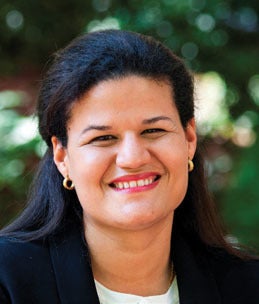
GENERAL COUNSEL
HUMANE SOCIETY WILDLIFE LAND TRUST
ARLINGTON, VA, USA
AGE: 39
Julisa Edwards’ in-house career has been intertwined with nonprofit conservation work for over a decade. She has lent her legal expertise to protecting the Earth’s resources from the forest to the sea, and now, as general counsel at the Humane Society Wildlife Land Trust, for the protection of wildlife habitats around the globe. Julisa gravitated to the nonprofit sector because of the solidarity she saw within the organizations — people from different nations working together for the greater good.
Julisa approaches environmental conservation from a property law lens. “Property doesn’t really entail just the right to own the land,” she explains. “It’s the right to use it, rent it out, divide it, and so many other aspects. It’s fascinating how it’s evolved from Roman law.” During her time as senior attorney for the Nature Conservancy, Julisa employed this her knowledge of property law for the protection of the Costa Rican rainforest. Building upon the trust structure of the Roman-based fideicomiso, Julisa pioneered a public interest trust that would allow the Costa Rican government to direct funds to its park system. The mechanism, which designated the parks as its beneficiary, was the first of its kind in the country. Julisa proudly shares that it is still in place ten years later.
Also with the Nature Conservancy, Julisa worked with Costa Rican and US government officials to orchestrate the largest debt-for-nature swap in Costa Rica’s history. The agreement reduced Costa Rica’s foreign debt by US$26 million in exchange for the country spending that amount on rainforest conservation. This was further augmented with funds from private funders to reach a US$50 million endowment.
Both projects required Julisa to understand and navigate the Costa Rican civil law and US common law systems. But she was prepared for the challenge — Julisa has practiced as a civil attorney in her native Dominican Republic and a common law attorney in the United States. She also holds an LLM from the University of London.
Julisa’s conservation efforts turned to the ocean when she worked as associate general counsel for the Pew Charitable Trusts. She formulated the legal framework for a software to track illegal fishing. It required drafting licensing agreements, grants, and NDAs, as well as working with technical leads, programmers, and law enforcement, leading to increased enforcement actions against illegal fishing.
Juggling different roles is a critical component of being a lawyer for an environmental nonprofit. Whether coordinating with public officials, law enforcement, or technical vendors, Julisa explains that it’s pivotal to understand your role. “Are you buying or selling something? Is it going to be a long-term or short-term relationship? It’s important to make sure that you have a clear understanding of what is expected from you, what’s expected from them, and possible constraints that may arise while trying to find some sort of compromise.”
Julisa is committed to sharing her expertise and learning from colleagues in the nonprofit sector. As chair of the ACC Nonprofit Network, she organizes sessions for the ACC Annual Meeting, plans online programs — the network recently coordinated one on responding to the COVID-19 pandemic — recruits new members and leaders, secures sponsors, and authors articles for the ,ACC Docket. Within the network, Julisa has seen a reflection of the same solidarity that first drew her to the industry: “When I want to tackle a subject that I don’t know about, I can work with people on the peer group to figure out how we can produce resources that could help not only me and my own work, but help others.”




